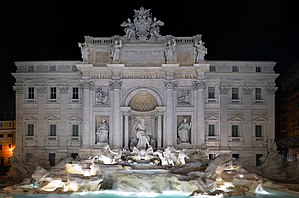Trevi Fountain
| Italian: Fontana di Trevi | |
 |
|
| Artist | Nicola Salvi |
|---|---|
| Year | 1762 |
| Type | Public fountain |
| Medium | Stone |
| Dimensions | 26.3 m × 49.15 m (86 ft × 161.3 ft) |
| Location | Trevi, Rome, Italy |
| 41°54′3.15″N 12°28′59.4″E / 41.9008750°N 12.483167°ECoordinates: 41°54′3.15″N 12°28′59.4″E / 41.9008750°N 12.483167°E | |
The Trevi Fountain (Italian: Fontana di Trevi) is a fountain in the Trevi district in Rome, Italy, designed by Italian architect Nicola Salvi and completed by Pietro Bracci. Standing 26.3 metres (86 ft) high and 49.15 metres (161.3 ft) wide, it is the largest Baroque fountain in the city and one of the most famous fountains in the world. The fountain has appeared in several notable films, including Federico Fellini's La Dolce Vita.
The fountain at the junction of three roads (tre vie) marks the terminal point of the "modern" Acqua Vergine, the revived Aqua Virgo, one of the aqueducts that supplied water to ancient Rome. In 19 BC, supposedly with the help of a virgin, Roman technicians located a source of pure water some 13 km (8.1 mi) from the city. (This scene is presented on the present fountain's façade.) However, the eventual indirect route of the aqueduct made its length some 22 km (14 mi). This Aqua Virgo led the water into the Baths of Agrippa. It served Rome for more than 400 years.
Legend holds that in 19 BC thirsty Roman soldiers were guided by a young girl to a source of pure water thirteen kilometres (8.1 miles) from the city of Rome. The discovery of the source led Augustus to commission the construction of a twenty-two-kilometre (14-mile) aqueduct leading into the city, which was named Aqua Virgo, or Virgin Waters, in honour of the legendary young girl. The aqueduct served the hot Baths of Agrippa, and Rome, for over four hundred years.
In 1629 Pope Urban VIII, finding the earlier fountain insufficiently dramatic, asked Gian Lorenzo Bernini to sketch possible renovations, but the project was abandoned when the pope died. Though Bernini's project was never constructed, there are many Bernini touches in the fountain as it exists today. An early, influential model by Pietro da Cortona, preserved in the Albertina, Vienna, also exists, as do various early 18th century sketches, most unsigned, as well as a project attributed to Nicola Michetti one attributed to Ferdinando Fuga and a French design by Edme Bouchardon.
...
Wikipedia
